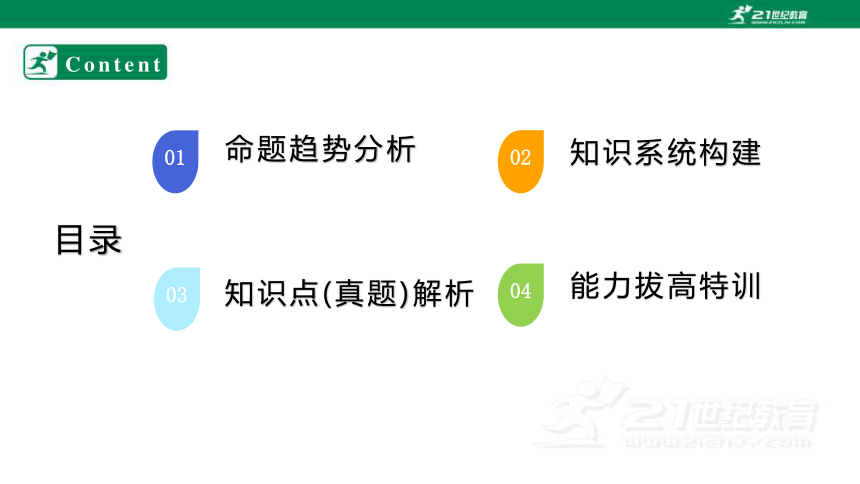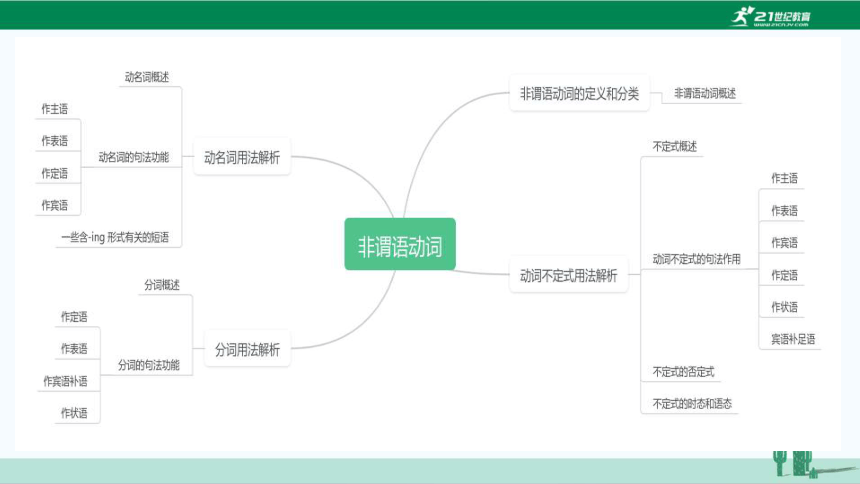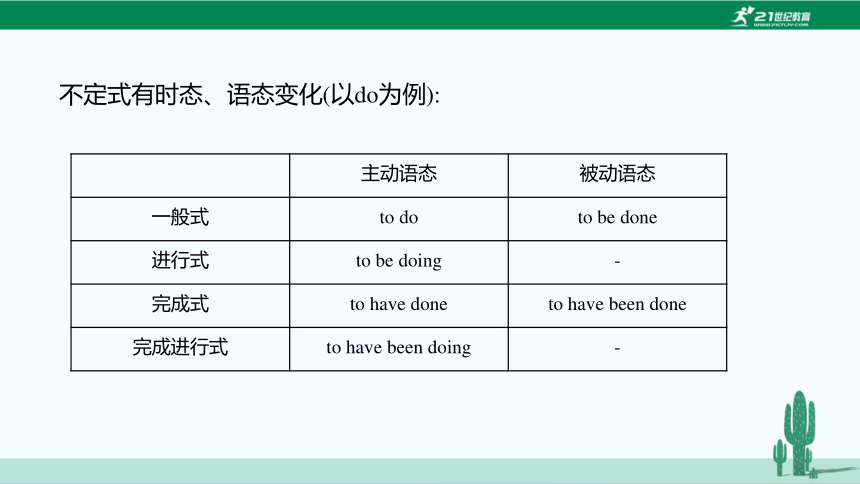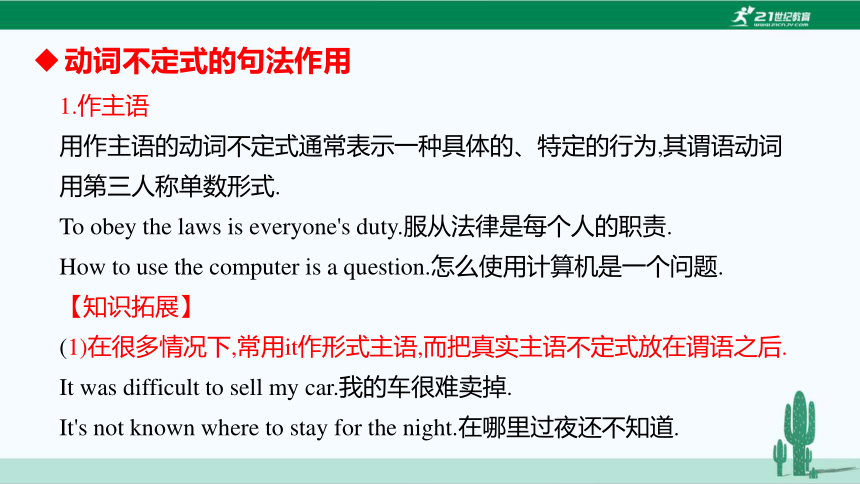13 非谓语动词专项复习课件 2024中考二轮复习(知识讲解+真题解析+能力拔高)
文档属性
| 名称 | 13 非谓语动词专项复习课件 2024中考二轮复习(知识讲解+真题解析+能力拔高) |

|
|
| 格式 | pptx | ||
| 文件大小 | 30.9MB | ||
| 资源类型 | 试卷 | ||
| 版本资源 | 通用版 | ||
| 科目 | 英语 | ||
| 更新时间 | 2024-05-23 15:53:41 | ||
图片预览












文档简介
(共72张PPT)
13 非谓语动词专项复习
2024年中考二轮复习
Content
命题趋势分析
01
知识系统构建
02
知识点(真题)解析
03
能力拔高特训
04
目录
命题趋势分析
非谓语动词的命题方向主要以点:
一、不定式作宾语、宾补,状语;
二、动名词作宾语、定语;
三、分词作表语、定语和状语;
从近几年的中考情况来看,非谓语动词是必考的命题点,主要考察不定式、动名词以及分词充当各种成分,如宾语,定语,表语、状语和宾补的各种情况,。
从考查形式看,一般有单项选择、完形填空、词语运用等。
知识系统构建
知识点(真题)
解析
非谓语动词就是在句子中不能单独作谓语的动词。
They made plans to live in Paris.他们计划住在巴黎。(句中第一个动词made是作为整个句子的谓语动词,第二个动词live是不充当句子谓语的动词,和to一起构成动词不定式。)
非谓语动词非谓语动词包含四种形式,即不定式、动名词、现在分词和过去分词。
非谓语动词概述
非谓语动词的定义和分类
动词不定式的基本形式是:“to+动词原形”,有时可以不带to.
动词不定式没有人称和数的变化
在句子中不能作谓语,但可以担任除谓语外的任何成分,主语、表语、宾语、定语、状语和宾语补足语.
动词不定式和它的宾语或状语构成不定式短语.
动词不定式用法解析
不定式概述
不定式有时态、语态变化(以do为例):
主动语态 被动语态
一般式 to do to be done
进行式 to be doing -
完成式 to have done to have been done
完成进行式 to have been doing -
动词不定式的句法作用
1.作主语
用作主语的动词不定式通常表示一种具体的、特定的行为,其谓语动词用第三人称单数形式.
To obey the laws is everyone's duty.服从法律是每个人的职责.
How to use the computer is a question.怎么使用计算机是一个问题.
【知识拓展】
(1)在很多情况下,常用it作形式主语,而把真实主语不定式放在谓语之后.
It was difficult to sell my car.我的车很难卖掉.
It's not known where to stay for the night.在哪里过夜还不知道.
(2)不定式的逻辑主语的引出:
如果要表示不定式的动作是谁做的,也就是说引出不定式的逻辑主语,一般在不定式前加一个for短语.
It will be a regret for us not to help him.我们没有帮助他是个遗憾.
当某些表示个人品质或性格特征的形容词(如kind, good, nice, wise, unwise, clever, silly, wrong, right, foolish, stupid, careless, considerate, rude, naughty, impolite等)作表语时,不定式前常可用of来说明不定式指的是谁的情况.
It would be rude of us to refuse their invitation.(我们)拒绝他们的邀请,会显得无礼.
2.作表语
作表语,一般紧跟在系动词,如:be, seem, get等后面,用以说明主语.
The question is when to start.问题是什么时候启程.
You seem to have lost weight.你好像减肥了.
What we have to do first is to find a solution.我们得做的第一件事是找出一个解决办法.
【知识拓展】
当不定式所作的表语仅用来说明主语的内容时,这个不定式只作单纯的表语,而不具有未来的含义.
3.作宾语
能以不定式作宾语的动词很多,常见的有:agree, begin, decide, expect, forget, hope, learn, like, manage, pretend, start, try, want, wish等.
They decided to learn English hard.他们决定好好学英语.
Don't forget to meet me at 6:00.别忘了六点钟和我见面.
【知识拓展】
有些动词,如:tell, advise, show, teach, know, forget, learn , remember, show, understand, see, wonder, hear, find out, explain, decide, discuss等后面,常用带疑问词的不定式作宾语.
We don't know who(whom)to ask.我们不知道问谁.
We asked how to get to the station.我们问怎么到达车站.
主语+ be + happy(glad, pleased, angry, sorry, careful, ready等)+to do sth.如:
I’m glad to see you again. 我很高兴再次见到你。
I’m sorry to hear that. 听到这个消息我感到遗憾。
在had better, would rather, would rather...than, cannot but, do nothing but等结构后面的不定式要省略“to”.
You had better write it in English.你最好用英文写.
I would rather stay at home.我宁愿待在家里.
4.作定语
I have no time to waste.我没有时间可浪费.
Let me find a place to park.我来找个停车的地方.
He is always the first to come to work and the last to leave.他总是第一个来上班,最后一个走.
【知识拓展】
不定式修饰something, anything, nothing时,放在它们的后面.如果 something, anything, nothing 有形容词来修饰,词序是something...+形容词+不定式.
My father had something to do.我父亲有事要办.
Have you got anything important to buy 你有什么重要的东西要买吗
5.作状语
不定式常可用作状语,表示目的、结果、原因等.
(1) 作目的状语
为加强语气在否定式前还可加上in order或so as组成词组(即:in order to...,so as to...).
To live a long and healthy life, we must learn to have a balanced diet.
为了能过长寿而健康的生活,我们必须懂得吃均衡的食品.
I stayed there so as to see what would happen.我留在那儿,为的是想看看会发生什么事.
In order to help him, we would do everything we can.为了帮助他,我们愿意尽一切力量.
(2).作结果状语
表结果,其逻辑主语通常亦是全句的主语.在“so...as to...”“such...as to..“ enough to...”“only to...”以及“too...to...”等结构中的不定式皆表示结果.
She is old enough to go to school.她已到了可以上学的年龄了.
He was too drunk to drive home.他酩酊大醉,没法开车回家.
(3).作原因状语
She trembled to think of the terrible accident.想到那可怕的车祸,她就不寒而栗.
We jumped with joy to hear the news.听到这消息,我们都高兴地跳了起来.
6.宾语补足语
(1)、能用不定式作宾语补足语常见的动词有:advise, ask, tell, help, wish, want, expect, forbid, persuade, press, request, teach, warn等.
She asked her grandfather to play game with her.她请爷爷跟她一起做游戏.
Mother told me to cook the meal.妈妈叫我做饭.
(2).有一些动词后用作宾语补足语的不定式通常不带to,这种动词有两类:一类是感觉动词,另一类是使役动词
Let me do it for you.让我来替你做.
Don't let her go out.别让她出去.
I made him work hard.我迫使他加劲干.
【知识拓展】
动词help之后,复合宾语中的不定式可带to,亦可不带to.
在上述动词转换为被动结构时,其后的不定式必须带to.
He was seen to enter the theatre.有人看见他走进了剧院.
I was made to do my homework the whole night.我被迫整晚做作业.
Can you help me (to) move this table 你能帮我移动一下这张桌子吗
②在一些感官动词后作宾语补足语,不带to的不定式着重于动作的全过程,用动词-ing形式则是强调当时动作的进行情况.
I heard Meimei singing in her room when I went past.
我路过的时候听见梅梅在房间里唱歌.(路过的瞬间正在唱,所以用singing)
We often hear Meimei sing in her room.我们经常听见梅梅在房间里唱歌.(经常听见,用不定式)
③.当谓语动词为think, make, find, consider, feel, regard等词,作宾语的不定式后面有宾语补足语时,常用it作形式宾语,而将真正的宾语放在补足语的后面
I find it easy to learn English well.我发现要把英语学好很容易.
不定式的否定式:not+不定式
She asked me not to drive him to the station.她要我不要开车送他到车站.
Try not to be late.争取不要迟到.
Mary asked me not to give my pen to Jimmy.玛丽让我别把笔给吉米.
She decided not to come here again.她决定不再到这儿来.
不定式的否定式
1.不定式的进行时态
进行式:表示在谓语动词所表示的动作或状态发生时正在进行.
It's nice to be sitting here with you.在这儿陪你坐着是非常愉快的.
It is unwise for him to be talking that topic all the time.他老是谈论这件事,很不明智.
不定式的时态和语态
2.不定式的完成时态
完成式表示在谓语动词的动作或状态发生时已经完成.
She said she was sorry to have missed you.她说她没见到你很遗憾.
He seemed to have visited our factory.他好像参观过我们的工厂.
They appeared to have met before.他们看来以前见过面.
3.动词不定式的被动语态表示被动意义
I didn't want to be told about it.我不想被告知这件事.
Nothing seems to have been forgotten.似乎什么也没有被遗忘.
The building is said to have been destroyed in a fire two years ago.据说这幢大楼两年前已毁于一场大火.
动名词是一种动词的非谓语形式,它兼有动词和名词的特征,由动词原形加词尾-ing而成,其构成法与现在分词一样.动名词有时态和语态的变化.(以do为例)
动名词用法解析
动名词概述
主动语态 被动语态
一般式 doing being done
完成式 having done having been done
动名词的否定是直接在其前面加否定词“not”构成
I'm sorry for not having informed you of the meeting.抱歉没通知你开会.
I regret not having gone together with her.我后悔没有跟她一起去.
动名词的句法功能
1.作主语
动名词形式作主语通常表示一种抽象的动作概念,即泛指某种行为或动作.
Eating too much is bad for your health.吃得太多对身体健康有害.
Is playing basketball after lunch good or bad for your health 吃完午饭就打篮球对身体健康有益还是有害
Travelling abroad can widen one's outlook.出国旅行会扩大人们的视野.
【知识拓展】
(1)动名词短语作主语,可以用it作形式主语,而将-ing分词短语移到谓语部分之后,以避免句子结构头重脚轻.
Having his brother here will make him happier.
It will make him happier having his brother here.
让他的兄弟待在这里将会使他高兴一些.
Swimming in this river is dangerous.
(2)动名词作主语还可以用于“There is no+-ing形式”(····是不可能的)结构.
There is no smoking here.这里不许吸烟.
There is no joking about such matters.这件事开不得玩笑.
(二)作表语
动名词形式(短语)作表语有时起名词作用,泛指动作,有时起形容词作用,指主语的性质、状态.
His hobby is collecting stamps.他的爱好是集邮.
The news is exciting.这消息令人兴奋.
The food smells inviting.这道菜香味怡人.
My favourite sport is playing table tennis.我最喜欢的运动是乒乓球.
The only thing she is interested in is dancing.她唯一感兴趣的就是跳舞.
(三)作定语
动名词形式作定语只表明它所修饰的词的用途、所属关系等,置于被修饰词之前.
a working method 工作方法 a dining car 餐车
a swimming pool 游泳池 building materials 建材
a reading room 阅览室
(四)作宾语
在某些动词或者短语后面不能用不定式,而必须用动名词作为宾语,这些动词有:suggest, finish, avoid, stop, can't help, mind(在乎),admit, advise, consider, enjoy, require, practise, miss,be worth,be busy,have fun,have trouble/problem(in),spend...(in),feel like,be used to(习惯于),give up,consider,
可按下面的顺口溜记忆这些词:
完成实践值得忙(finish,practice,be worth,be busy)
继续习惯别放弃(keep on,be used to,give up)
考虑建议不禁想(consider,suggest,can’t help,feel like)
喜欢思念要介意(enjoy,miss,mind)
I can't help laughing.我禁不住笑了起来.
Return the book to the library as soon as you finish reading it.你一看完这本书就还回图书馆.
He enjoys watching TV plays.他喜欢看电视剧.
【知识拓展】
有些动词后既可用动名词,也可用不定式.
在动词love, like, begin, start, continue等后,既可用动名词作宾语,也可用不定式作宾语,有时两种结构的意义差别不大.
某些动词后面接动名词和不定式作宾语意义差别很大
词 动名词 不定式
stop stop doing sth.停止做某事 stop to do sth.停止、中断某事后去做另一件事
forget forget doing sth.忘记做过某事(事情已做) forget to do sth. 忘记要去做某事(事情没做)
remember remember doing sth.记得做过某事(事情已做) remember to do sth.记着去做某事(事情没做)
try try doing sth.尝试着去做某事 try to do sth.设法或努力去做某事
go on go on doing sth.继续不停地做同一件事情 go on to do sth.做完一件事,接着去做另一件事
allow allow doing sth.允许做某事 allow sb.to do sth.允许某人做某事
regret regret doing sth.对做过的事情感到遗憾、后悔(已做) regret to do sth.对要做的事感到遗憾(未做)
mean mean doing sth.意味着做某事 mean to do sth.打算、想做某事
I regret telling you the bad news.我后悔把这个坏消息告诉你.
I regret to say I'm unable to help you.很抱歉我不能帮助你.
Let's stop talking about it.咱们停止谈论这件事情吧.
We stopped to see what happened.我们停下来去看发生了什么事情.
I forgot giving the letter to her.我忘了,已经把信给她了.
I forgot to post the letter.我忘记发信了.
Let's try doing the work some other way.我们用别的方法做这工作试试.
We must try to get everything done in time.我们必须设法及时把一切搞好.
1.表示有目的、有意识地进行练习或训练某项技能:do+(some)+v.-ing
do some reading 读读书 do some running跑跑步do some writing练练字
This year I am going to do more speaking.今年我要多练口语.
2.表示做一些笼统、不具体指明的事:do+(some)+v.-ing
do some shopping 去商店买东西(不指明买哪样具体的东西)
do some washing 洗东西 do some cooking 做饭
do some cleaning 扫除 do some sewing 缝纫
一些含-ing 形式有关的短语
3.“go+ v.-ing形式”大部分表示从事运动、消遣或娱乐活动
go dancing 去跳舞 go swimming去游泳
go skating 去滑冰 go skiing 去滑雪
go shooting去射击 go boating去划船
go fishing去钓鱼 go hunting去打猎
go riding去骑马 go walking去散步
go running去跑步 go sailing去航海
分词分为现在分词和过去分词两种。
现在分词的基本形式由“动词+-ing”构成;过去分词的基本形式是“动词+-ed”,但也有不规则的形式。
分词用法解析
分词概述
时态 主动形式 被动形式
一般式 (not)doing (not)being done
完成式 (not)having done (not)having been done
现在分词有时态和语态的变化,现在分词的一般式表示动作与谓语动词的动作同时发生;
现在分词的完成式表示动作发生在谓语动词的动作之前,现在分词的主动形式表示逻辑主语是现在分词动作的执行者;
现在分词的被动形式表示逻辑主语是现在分词动作的承受者;过去分词没有时态和语态的变化,只有一般式。
Walking down the street,he hears someone calling him.在街上走着,他听到有人叫他。
Having spent nearly all our money,we couldn't afford to stay at a hotel.我们几乎花光了所有的钱,没有钱住宾馆了。
Not knowing her address,we couldn't get in touch with her.由于不知道她的住址,我们无法和她取得联系。
The area being studied is called an archeological site.正在被研究的那个地方被称作考古地。
The houses being built are for the teachers.正在建的那些房子是给老师们的。
Given another hour,I can also work out this problem.再给我一个小时,我也能做出这道题。
分词的句法功能
1.作定语
(1)现在分词作定语,相当于一个定语从句,强调一般性或者是正在进行的状态或动作,其逻辑主语就是它所修饰的词,二者是逻辑上的主谓关系,单个词通常要前置,短语要后置。
a swimming boy相当于a boy who is swimming(正在进行的动作)
John has really got the job because he showed me the official letter offering him it 相当于John has really got the job because he showed me the official letter which/that offers him it约翰的确得到了这份工作,因为他给我看了提供他工作的正式信函。(一般性的动作)
【拓展】注意现在分词和动名词作定语的区别。
动名词作定语通常表示它所修饰的名词的用途或性能,二者不存在逻辑上的主谓关系。动名词作定语只能置于被修饰词的前面,而现在分词作定语有时可前置,有时可后置,尤其是现在分词短语作定语时要后置。
a sleeping car(a car for sleeping)卧车
a washing machine(a machine for washing)洗衣机
a walking stick =a stick (which is used)for walking拐杖
a reading room=a room(which is used)for reading阅览室
a swimming boy=a boy who is swimming一个正在游泳的男孩(现在分词作定语)
a swimming pool=a pool for swimming游泳池(动名词作定语)
(2)过去分词作定语,相当于一个定语从句,及物动词的过去分词作定语,表示被动和完成;不及物动词的过去分词一般作前置定语,不表示被动,只表示完成。
There are fallen leaves on the ground in fall.秋天地上到处是落叶。(只表示完成,不表示被动)
Look at the broken glasses.看看这些碎了的玻璃杯。(表示被动和完成)
【拓展】注意现在分词和过去分词作定语的区别。
现在分词表示正在进行;过去分词表示已经完成。
boiling water正在沸腾的水
boiled water开水
developing countries发展中国家
developed countries发达国家
2.作表语
现在分词表示主动意义,作表语,说明主语具有某些令人如何的特征,即“令人有某种感觉,让别人觉得他怎么样”
过去分词含有被动意味,作表语一般是说明主语自身的一种感受和状态。即“人被引起某种感觉,主语自己觉得怎么样”。
He's really amusing and tells jokes when he thinks we're getting bored.他的确幽默风趣,而且当他认为我们感到厌烦时,就会给我们讲笑话。(他是给别人一种他很幽默风趣的感觉)
She is interested in the story.她对那个故事感兴趣。(她自己对书感兴趣)
The boy is too frightened to move.这个男孩太害怕了,以至于不能动了。(男孩自己害怕)
exciting令人兴奋的,激动人心的 excited兴奋的,激动的
frightening吓人的 frightened受惊吓的
disappointing令人失望的 disappointed感到失望的,失望的
pleasing令人高兴的 pleased高兴的,满意的
satisfying令人满意的 satisfied感到满意的
surprising令人惊讶的 surprised感到惊讶的
moving令人感动的 moved受感动的,感动的
interesting有趣的 interested感兴趣的
amusing给人娱乐的 amused感到有意思的
puzzling人迷感不解的 puzzled感到困感不解的
encouraging令人效舞的 encouraged受到鼓舞的
tiring令人厌俗的/劳累的 tired感到疲借的
3. 作宾语补语
(1)现在分词作宾语补语说明宾语的性质、特征或正在做的动作。一般在感官动词和使役动词后用现在分词表示正在进行的主动意义,变成被动语态时,宾语补足语相应的变为主语补足语。
使役动词/感官动词+宾语+现在分词作宾补(意义主动或正在进行)
I have two men working for me in the company.我让两个人在公司为我工作。(表示主动进行)
I heard an English song being sung by a little girl at the English evening.(sing动作正在被做)我在英语晚会上听见有个小女孩唱英文歌。
(2)及物动词的过去分词作补足语,与宾语构成被动关系。有少数不及物动词的过去分词作补足语,表示完成或状态。变为被动语态时,宾语补足语相应变为主语补足语。
A liar can not make himself believed.习惯于说谎的人无法让别人相信自己。
I was surprised to find my hometown changed so much.发现我的家乡变化很大后我感到十分惊讶。
Before driving into the city,you are required to get your cur washed.开车进入市区之前,你必修把车洗一洗。
4.作状语
分词在句中作结果、时间、原因、伴随、方式、条件、让步等状语,分词的逻辑主语是句子的主语,现在分词与句子的主语是主动关系。过去分词与句子的主语是被动关系。分词作状语时有时可以改为相应的从句
Living far from the school, he has to get up early every morning.由于住的离学校远,他必修每起。(原因状语,Living的逻辑主语就是句子的主语he,并且是主动关系)
Seeing nobody at home,she decided to leave therm a note看到没人在家,她决定给他们留个便条。(主动意义,非谓语动词的动作与谓语动词的动作同时发生)
Having waited for an hour,he realized he had left his wallet at home.等了一个小时后,他意识到他把钱包落在了家中。(主动意义,非谓语动词的动作发生在动词的动作之前)
Having been asked to work overtime that evening,I missed a wonderfiul film我那天晚上因为被要求加班而错过了一场精彩的电影。(被动意义,非谓语动词的动作在谓语动词的动作之前)
Given enough money, I will buy that car at once.可以改成If l am given enough money, I will buy that car at once.如果有足够的钱,我会马上买下那辆车。
Frightened by the noise outside,the little girl dared not sleep in her bedroom.由于受到外面噪音的惊吓,小女孩不敢在卧室里睡觉了。
【拓展】在when,while,if,as if,though,as,until,once,whether,unless,where等连词连接的状语从句中,常省略跟主句主语相同的主语和be动词,形成“连词+分词短语”结构。
When treated with kindness, he was very lovely.当友好地对待他时,他很可爱。
When reading the novel, I heard the telephone ring.看小说时我听到电话响了。
1.(2023·天津·统考中考真题)David learnt ________ when he was five.
A.swim B.swims C.swam D.to swim
【答案】D
【详解】句意:大卫五岁时学习游泳。
考查非谓语动词。learn to do sth“学习做某事”,为固定短语,故选D。
真题再现
2.(2023·云南·统考中考真题)Today is Father’s Day, and I plan ________ a dinner for my father.
A.to prepare B.preparing C.prepared D.prepare
【答案】A
【详解】句意:今天是父亲节,我打算为父亲准备一顿晚餐。
考查非谓语动词。plan to do sth“计划做某事”,为固定短语,故选A。
3.(2023·四川泸州·统考中考真题)— What are you going to do this summer vacation
— I plan ________ Hua Hua, a nearly 3-year-old lovely panda in Chengdu.
A.see B.saw C.seeing D.to see
【答案】D
【详解】句意:——这个暑假你打算做什么?——我计划去成都看一只将近3岁的可爱熊猫花花。
考查动词不定式。plan to do sth“计划做某事”,空格处为动词不定式作宾语。故选D。
4.(2023·四川达州·统考中考真题)—The Lifelong Journey is one of the most touching books ________ I have ever read.
—Yeah, the book is fantastic and I am looking forward to ________ it again.
A.that, reading B.which, to read C.that, to read
【答案】A
【详解】句意:——《人世间》是我读过的最感人的书之一。——是的,这本书很棒,我期待着再读一遍。
考查定语从句和非谓语动词。第一处是定语从句,有最高级修饰先行词,只能用that,排除B;look forward to doing sth“期待做某事”。故选A。
5.(2023·四川达州·统考中考真题)The teachers used to ________ key points on the blackboard, but now they are getting used to ________ them through PPTs.
A.write, showing B.writing, show C.write, show
【答案】A
【详解】句意:老师们过去常常把重点写在黑板上,但现在他们已经习惯了通过PPT来展示。
考查非谓语动词。used to do sth.过去常常做某事,第一空应为动词原形write。get used to doing sth.习惯于做某事,第二空应为动名词showing。故选A。
6.(2023·四川自贡·统考中考真题)—Mike, we are told not ________ the phone while crossing the street.
—I am sorry. I won’t do it again.
A.answering B.to answer C.answer
【答案】B
【详解】句意:——迈克,我们被告知过马路时不要接电话。——对不起。我不会再这样做了。
考查非谓语动词语。be told not to do sth“被告知不要做某事”,故选B。
7.(2023·江苏扬州·统考中考真题)Science is my favourite subject, so I have prepared ________ the STEAM Club.
A.join B.joining C.to join D.to joining
【答案】C
【详解】句意:科学是我最喜欢的科目,所以我已经准备加入 STEAM俱乐部了。
考查非谓语动词。prepare to do sth“准备做某事”,固定短语,所以空处用动词不定式,故选C。
8.(2023·湖南怀化·统考中考真题)Many people enjoy ______ zongzi by themselves on the Dragon Boat Festival.
A.making B.made C.to make
【答案】A
【详解】句意:许多人喜欢在端午节自己包粽子。
考查非谓语动词。enjoy doing sth“喜欢做某事”,动名词作宾语,故选A。
能力拔高特训
一、单项选择
1.The young player spends four hours _______ volleyball every day.
A.practise B.practising C.to practise D.practised
【答案】B
2.The Internet enables farmers _______ fruits and vegetables across the country.
A.sell B.selling C.to sell D.sold
【答案】C
3.Good news comes that China has sent Shenzhou XIV to space ________ the unknown world.
A.explore B.explored C.exploring D.to explore
【答案】D
4.— Father, I’m afraid I can’t win the English competition.
— Believe in yourself, my girl, and tell yourself ________ .
A.don’t give up B.not to give up C.to give up
【答案】B
5.—Do you know there are more than 3,000 languages ______ in the world
—Sorry, I have no idea.
A.speaking B.spoken C.speak D.spoke
【答案】B
6.Many people have lost their homes because of wars. It’s important for people ________ a peaceful world.
A.have B.had C.to have D.to be having
【答案】C
7.—Peter always remembers ________ the light off when he leaves the room.
—That’s great. It’s a good way to save energy.
A.shut B.shutting C.to shut
【答案】C
8.The teacher told us ________ too much noise because the other students were having an exam.
A.to not make B.not to make C.not make D.not making
【答案】B
9.The Great Wall is so famous that a large number of travellers wish ______ it.
A.visit B.visiting C.to visit D.visited
【答案】C
10.—Miss Li, can you tell me how to improve my writing skills
—Certainly. I advise you ________ a diary in English every day.
A.to keep B.keeping C.kept D.keeps
【答案】A
11.Many students practice _______ in the morning because of the P.E. exam.
A.run B.running C.ran
【答案】B
12.The painting is really valuable to him. He will never agree ________ it.
A.sell B.sells C.sold D.to sell
【答案】D
13.________ the people locked inside, the firemen broke down the door.
A.Reach B.To reach C.Reaching D.To reaching
【答案】B
14.The teacher told Jack _______ off the light when he left the classroom.
A.turn B.turning C.to turn
【答案】C
15.Boys and girls, good luck and wish you ________ good grades on your new journey!
A.cutting B.to cut C.getting D.to get
【答案】D
16.If you want ________ your pronunciation, keep on practicing every day.
A.improve B.improved C.improving D.to improve
【答案】D
17.The local government advises people ________ to other places ________ it is not necessary during the pandemic.
A.travel; unless B.to not travel; if
C.not to travel; unless D.not to travel; if
【答案】D
18.—Hurry up, Jason! We’re going to the cinema, but the clothes still need ________.
—Don’t worry. I think thirty minutes ________ enough.
A.washing; are B.to wash; are
C.to wash; is D.washing; is
【答案】D
19.As teenagers, we are not allowed ________ mobile phones into school so that we can focus on our schoolwork.
A.bring B.to bring C.bringing D.brought
【答案】B
20.Mr. Brown told his son not ________ the paintings in the museum.
A.touch B.to touch C.touching D.touched
【答案】B
谢谢
21世纪教育网(www.21cnjy.com)
中小学教育资源网站
兼职招聘:
https://www.21cnjy.com/recruitment/home/admin
13 非谓语动词专项复习
2024年中考二轮复习
Content
命题趋势分析
01
知识系统构建
02
知识点(真题)解析
03
能力拔高特训
04
目录
命题趋势分析
非谓语动词的命题方向主要以点:
一、不定式作宾语、宾补,状语;
二、动名词作宾语、定语;
三、分词作表语、定语和状语;
从近几年的中考情况来看,非谓语动词是必考的命题点,主要考察不定式、动名词以及分词充当各种成分,如宾语,定语,表语、状语和宾补的各种情况,。
从考查形式看,一般有单项选择、完形填空、词语运用等。
知识系统构建
知识点(真题)
解析
非谓语动词就是在句子中不能单独作谓语的动词。
They made plans to live in Paris.他们计划住在巴黎。(句中第一个动词made是作为整个句子的谓语动词,第二个动词live是不充当句子谓语的动词,和to一起构成动词不定式。)
非谓语动词非谓语动词包含四种形式,即不定式、动名词、现在分词和过去分词。
非谓语动词概述
非谓语动词的定义和分类
动词不定式的基本形式是:“to+动词原形”,有时可以不带to.
动词不定式没有人称和数的变化
在句子中不能作谓语,但可以担任除谓语外的任何成分,主语、表语、宾语、定语、状语和宾语补足语.
动词不定式和它的宾语或状语构成不定式短语.
动词不定式用法解析
不定式概述
不定式有时态、语态变化(以do为例):
主动语态 被动语态
一般式 to do to be done
进行式 to be doing -
完成式 to have done to have been done
完成进行式 to have been doing -
动词不定式的句法作用
1.作主语
用作主语的动词不定式通常表示一种具体的、特定的行为,其谓语动词用第三人称单数形式.
To obey the laws is everyone's duty.服从法律是每个人的职责.
How to use the computer is a question.怎么使用计算机是一个问题.
【知识拓展】
(1)在很多情况下,常用it作形式主语,而把真实主语不定式放在谓语之后.
It was difficult to sell my car.我的车很难卖掉.
It's not known where to stay for the night.在哪里过夜还不知道.
(2)不定式的逻辑主语的引出:
如果要表示不定式的动作是谁做的,也就是说引出不定式的逻辑主语,一般在不定式前加一个for短语.
It will be a regret for us not to help him.我们没有帮助他是个遗憾.
当某些表示个人品质或性格特征的形容词(如kind, good, nice, wise, unwise, clever, silly, wrong, right, foolish, stupid, careless, considerate, rude, naughty, impolite等)作表语时,不定式前常可用of来说明不定式指的是谁的情况.
It would be rude of us to refuse their invitation.(我们)拒绝他们的邀请,会显得无礼.
2.作表语
作表语,一般紧跟在系动词,如:be, seem, get等后面,用以说明主语.
The question is when to start.问题是什么时候启程.
You seem to have lost weight.你好像减肥了.
What we have to do first is to find a solution.我们得做的第一件事是找出一个解决办法.
【知识拓展】
当不定式所作的表语仅用来说明主语的内容时,这个不定式只作单纯的表语,而不具有未来的含义.
3.作宾语
能以不定式作宾语的动词很多,常见的有:agree, begin, decide, expect, forget, hope, learn, like, manage, pretend, start, try, want, wish等.
They decided to learn English hard.他们决定好好学英语.
Don't forget to meet me at 6:00.别忘了六点钟和我见面.
【知识拓展】
有些动词,如:tell, advise, show, teach, know, forget, learn , remember, show, understand, see, wonder, hear, find out, explain, decide, discuss等后面,常用带疑问词的不定式作宾语.
We don't know who(whom)to ask.我们不知道问谁.
We asked how to get to the station.我们问怎么到达车站.
主语+ be + happy(glad, pleased, angry, sorry, careful, ready等)+to do sth.如:
I’m glad to see you again. 我很高兴再次见到你。
I’m sorry to hear that. 听到这个消息我感到遗憾。
在had better, would rather, would rather...than, cannot but, do nothing but等结构后面的不定式要省略“to”.
You had better write it in English.你最好用英文写.
I would rather stay at home.我宁愿待在家里.
4.作定语
I have no time to waste.我没有时间可浪费.
Let me find a place to park.我来找个停车的地方.
He is always the first to come to work and the last to leave.他总是第一个来上班,最后一个走.
【知识拓展】
不定式修饰something, anything, nothing时,放在它们的后面.如果 something, anything, nothing 有形容词来修饰,词序是something...+形容词+不定式.
My father had something to do.我父亲有事要办.
Have you got anything important to buy 你有什么重要的东西要买吗
5.作状语
不定式常可用作状语,表示目的、结果、原因等.
(1) 作目的状语
为加强语气在否定式前还可加上in order或so as组成词组(即:in order to...,so as to...).
To live a long and healthy life, we must learn to have a balanced diet.
为了能过长寿而健康的生活,我们必须懂得吃均衡的食品.
I stayed there so as to see what would happen.我留在那儿,为的是想看看会发生什么事.
In order to help him, we would do everything we can.为了帮助他,我们愿意尽一切力量.
(2).作结果状语
表结果,其逻辑主语通常亦是全句的主语.在“so...as to...”“such...as to..“ enough to...”“only to...”以及“too...to...”等结构中的不定式皆表示结果.
She is old enough to go to school.她已到了可以上学的年龄了.
He was too drunk to drive home.他酩酊大醉,没法开车回家.
(3).作原因状语
She trembled to think of the terrible accident.想到那可怕的车祸,她就不寒而栗.
We jumped with joy to hear the news.听到这消息,我们都高兴地跳了起来.
6.宾语补足语
(1)、能用不定式作宾语补足语常见的动词有:advise, ask, tell, help, wish, want, expect, forbid, persuade, press, request, teach, warn等.
She asked her grandfather to play game with her.她请爷爷跟她一起做游戏.
Mother told me to cook the meal.妈妈叫我做饭.
(2).有一些动词后用作宾语补足语的不定式通常不带to,这种动词有两类:一类是感觉动词,另一类是使役动词
Let me do it for you.让我来替你做.
Don't let her go out.别让她出去.
I made him work hard.我迫使他加劲干.
【知识拓展】
动词help之后,复合宾语中的不定式可带to,亦可不带to.
在上述动词转换为被动结构时,其后的不定式必须带to.
He was seen to enter the theatre.有人看见他走进了剧院.
I was made to do my homework the whole night.我被迫整晚做作业.
Can you help me (to) move this table 你能帮我移动一下这张桌子吗
②在一些感官动词后作宾语补足语,不带to的不定式着重于动作的全过程,用动词-ing形式则是强调当时动作的进行情况.
I heard Meimei singing in her room when I went past.
我路过的时候听见梅梅在房间里唱歌.(路过的瞬间正在唱,所以用singing)
We often hear Meimei sing in her room.我们经常听见梅梅在房间里唱歌.(经常听见,用不定式)
③.当谓语动词为think, make, find, consider, feel, regard等词,作宾语的不定式后面有宾语补足语时,常用it作形式宾语,而将真正的宾语放在补足语的后面
I find it easy to learn English well.我发现要把英语学好很容易.
不定式的否定式:not+不定式
She asked me not to drive him to the station.她要我不要开车送他到车站.
Try not to be late.争取不要迟到.
Mary asked me not to give my pen to Jimmy.玛丽让我别把笔给吉米.
She decided not to come here again.她决定不再到这儿来.
不定式的否定式
1.不定式的进行时态
进行式:表示在谓语动词所表示的动作或状态发生时正在进行.
It's nice to be sitting here with you.在这儿陪你坐着是非常愉快的.
It is unwise for him to be talking that topic all the time.他老是谈论这件事,很不明智.
不定式的时态和语态
2.不定式的完成时态
完成式表示在谓语动词的动作或状态发生时已经完成.
She said she was sorry to have missed you.她说她没见到你很遗憾.
He seemed to have visited our factory.他好像参观过我们的工厂.
They appeared to have met before.他们看来以前见过面.
3.动词不定式的被动语态表示被动意义
I didn't want to be told about it.我不想被告知这件事.
Nothing seems to have been forgotten.似乎什么也没有被遗忘.
The building is said to have been destroyed in a fire two years ago.据说这幢大楼两年前已毁于一场大火.
动名词是一种动词的非谓语形式,它兼有动词和名词的特征,由动词原形加词尾-ing而成,其构成法与现在分词一样.动名词有时态和语态的变化.(以do为例)
动名词用法解析
动名词概述
主动语态 被动语态
一般式 doing being done
完成式 having done having been done
动名词的否定是直接在其前面加否定词“not”构成
I'm sorry for not having informed you of the meeting.抱歉没通知你开会.
I regret not having gone together with her.我后悔没有跟她一起去.
动名词的句法功能
1.作主语
动名词形式作主语通常表示一种抽象的动作概念,即泛指某种行为或动作.
Eating too much is bad for your health.吃得太多对身体健康有害.
Is playing basketball after lunch good or bad for your health 吃完午饭就打篮球对身体健康有益还是有害
Travelling abroad can widen one's outlook.出国旅行会扩大人们的视野.
【知识拓展】
(1)动名词短语作主语,可以用it作形式主语,而将-ing分词短语移到谓语部分之后,以避免句子结构头重脚轻.
Having his brother here will make him happier.
It will make him happier having his brother here.
让他的兄弟待在这里将会使他高兴一些.
Swimming in this river is dangerous.
(2)动名词作主语还可以用于“There is no+-ing形式”(····是不可能的)结构.
There is no smoking here.这里不许吸烟.
There is no joking about such matters.这件事开不得玩笑.
(二)作表语
动名词形式(短语)作表语有时起名词作用,泛指动作,有时起形容词作用,指主语的性质、状态.
His hobby is collecting stamps.他的爱好是集邮.
The news is exciting.这消息令人兴奋.
The food smells inviting.这道菜香味怡人.
My favourite sport is playing table tennis.我最喜欢的运动是乒乓球.
The only thing she is interested in is dancing.她唯一感兴趣的就是跳舞.
(三)作定语
动名词形式作定语只表明它所修饰的词的用途、所属关系等,置于被修饰词之前.
a working method 工作方法 a dining car 餐车
a swimming pool 游泳池 building materials 建材
a reading room 阅览室
(四)作宾语
在某些动词或者短语后面不能用不定式,而必须用动名词作为宾语,这些动词有:suggest, finish, avoid, stop, can't help, mind(在乎),admit, advise, consider, enjoy, require, practise, miss,be worth,be busy,have fun,have trouble/problem(in),spend...(in),feel like,be used to(习惯于),give up,consider,
可按下面的顺口溜记忆这些词:
完成实践值得忙(finish,practice,be worth,be busy)
继续习惯别放弃(keep on,be used to,give up)
考虑建议不禁想(consider,suggest,can’t help,feel like)
喜欢思念要介意(enjoy,miss,mind)
I can't help laughing.我禁不住笑了起来.
Return the book to the library as soon as you finish reading it.你一看完这本书就还回图书馆.
He enjoys watching TV plays.他喜欢看电视剧.
【知识拓展】
有些动词后既可用动名词,也可用不定式.
在动词love, like, begin, start, continue等后,既可用动名词作宾语,也可用不定式作宾语,有时两种结构的意义差别不大.
某些动词后面接动名词和不定式作宾语意义差别很大
词 动名词 不定式
stop stop doing sth.停止做某事 stop to do sth.停止、中断某事后去做另一件事
forget forget doing sth.忘记做过某事(事情已做) forget to do sth. 忘记要去做某事(事情没做)
remember remember doing sth.记得做过某事(事情已做) remember to do sth.记着去做某事(事情没做)
try try doing sth.尝试着去做某事 try to do sth.设法或努力去做某事
go on go on doing sth.继续不停地做同一件事情 go on to do sth.做完一件事,接着去做另一件事
allow allow doing sth.允许做某事 allow sb.to do sth.允许某人做某事
regret regret doing sth.对做过的事情感到遗憾、后悔(已做) regret to do sth.对要做的事感到遗憾(未做)
mean mean doing sth.意味着做某事 mean to do sth.打算、想做某事
I regret telling you the bad news.我后悔把这个坏消息告诉你.
I regret to say I'm unable to help you.很抱歉我不能帮助你.
Let's stop talking about it.咱们停止谈论这件事情吧.
We stopped to see what happened.我们停下来去看发生了什么事情.
I forgot giving the letter to her.我忘了,已经把信给她了.
I forgot to post the letter.我忘记发信了.
Let's try doing the work some other way.我们用别的方法做这工作试试.
We must try to get everything done in time.我们必须设法及时把一切搞好.
1.表示有目的、有意识地进行练习或训练某项技能:do+(some)+v.-ing
do some reading 读读书 do some running跑跑步do some writing练练字
This year I am going to do more speaking.今年我要多练口语.
2.表示做一些笼统、不具体指明的事:do+(some)+v.-ing
do some shopping 去商店买东西(不指明买哪样具体的东西)
do some washing 洗东西 do some cooking 做饭
do some cleaning 扫除 do some sewing 缝纫
一些含-ing 形式有关的短语
3.“go+ v.-ing形式”大部分表示从事运动、消遣或娱乐活动
go dancing 去跳舞 go swimming去游泳
go skating 去滑冰 go skiing 去滑雪
go shooting去射击 go boating去划船
go fishing去钓鱼 go hunting去打猎
go riding去骑马 go walking去散步
go running去跑步 go sailing去航海
分词分为现在分词和过去分词两种。
现在分词的基本形式由“动词+-ing”构成;过去分词的基本形式是“动词+-ed”,但也有不规则的形式。
分词用法解析
分词概述
时态 主动形式 被动形式
一般式 (not)doing (not)being done
完成式 (not)having done (not)having been done
现在分词有时态和语态的变化,现在分词的一般式表示动作与谓语动词的动作同时发生;
现在分词的完成式表示动作发生在谓语动词的动作之前,现在分词的主动形式表示逻辑主语是现在分词动作的执行者;
现在分词的被动形式表示逻辑主语是现在分词动作的承受者;过去分词没有时态和语态的变化,只有一般式。
Walking down the street,he hears someone calling him.在街上走着,他听到有人叫他。
Having spent nearly all our money,we couldn't afford to stay at a hotel.我们几乎花光了所有的钱,没有钱住宾馆了。
Not knowing her address,we couldn't get in touch with her.由于不知道她的住址,我们无法和她取得联系。
The area being studied is called an archeological site.正在被研究的那个地方被称作考古地。
The houses being built are for the teachers.正在建的那些房子是给老师们的。
Given another hour,I can also work out this problem.再给我一个小时,我也能做出这道题。
分词的句法功能
1.作定语
(1)现在分词作定语,相当于一个定语从句,强调一般性或者是正在进行的状态或动作,其逻辑主语就是它所修饰的词,二者是逻辑上的主谓关系,单个词通常要前置,短语要后置。
a swimming boy相当于a boy who is swimming(正在进行的动作)
John has really got the job because he showed me the official letter offering him it 相当于John has really got the job because he showed me the official letter which/that offers him it约翰的确得到了这份工作,因为他给我看了提供他工作的正式信函。(一般性的动作)
【拓展】注意现在分词和动名词作定语的区别。
动名词作定语通常表示它所修饰的名词的用途或性能,二者不存在逻辑上的主谓关系。动名词作定语只能置于被修饰词的前面,而现在分词作定语有时可前置,有时可后置,尤其是现在分词短语作定语时要后置。
a sleeping car(a car for sleeping)卧车
a washing machine(a machine for washing)洗衣机
a walking stick =a stick (which is used)for walking拐杖
a reading room=a room(which is used)for reading阅览室
a swimming boy=a boy who is swimming一个正在游泳的男孩(现在分词作定语)
a swimming pool=a pool for swimming游泳池(动名词作定语)
(2)过去分词作定语,相当于一个定语从句,及物动词的过去分词作定语,表示被动和完成;不及物动词的过去分词一般作前置定语,不表示被动,只表示完成。
There are fallen leaves on the ground in fall.秋天地上到处是落叶。(只表示完成,不表示被动)
Look at the broken glasses.看看这些碎了的玻璃杯。(表示被动和完成)
【拓展】注意现在分词和过去分词作定语的区别。
现在分词表示正在进行;过去分词表示已经完成。
boiling water正在沸腾的水
boiled water开水
developing countries发展中国家
developed countries发达国家
2.作表语
现在分词表示主动意义,作表语,说明主语具有某些令人如何的特征,即“令人有某种感觉,让别人觉得他怎么样”
过去分词含有被动意味,作表语一般是说明主语自身的一种感受和状态。即“人被引起某种感觉,主语自己觉得怎么样”。
He's really amusing and tells jokes when he thinks we're getting bored.他的确幽默风趣,而且当他认为我们感到厌烦时,就会给我们讲笑话。(他是给别人一种他很幽默风趣的感觉)
She is interested in the story.她对那个故事感兴趣。(她自己对书感兴趣)
The boy is too frightened to move.这个男孩太害怕了,以至于不能动了。(男孩自己害怕)
exciting令人兴奋的,激动人心的 excited兴奋的,激动的
frightening吓人的 frightened受惊吓的
disappointing令人失望的 disappointed感到失望的,失望的
pleasing令人高兴的 pleased高兴的,满意的
satisfying令人满意的 satisfied感到满意的
surprising令人惊讶的 surprised感到惊讶的
moving令人感动的 moved受感动的,感动的
interesting有趣的 interested感兴趣的
amusing给人娱乐的 amused感到有意思的
puzzling人迷感不解的 puzzled感到困感不解的
encouraging令人效舞的 encouraged受到鼓舞的
tiring令人厌俗的/劳累的 tired感到疲借的
3. 作宾语补语
(1)现在分词作宾语补语说明宾语的性质、特征或正在做的动作。一般在感官动词和使役动词后用现在分词表示正在进行的主动意义,变成被动语态时,宾语补足语相应的变为主语补足语。
使役动词/感官动词+宾语+现在分词作宾补(意义主动或正在进行)
I have two men working for me in the company.我让两个人在公司为我工作。(表示主动进行)
I heard an English song being sung by a little girl at the English evening.(sing动作正在被做)我在英语晚会上听见有个小女孩唱英文歌。
(2)及物动词的过去分词作补足语,与宾语构成被动关系。有少数不及物动词的过去分词作补足语,表示完成或状态。变为被动语态时,宾语补足语相应变为主语补足语。
A liar can not make himself believed.习惯于说谎的人无法让别人相信自己。
I was surprised to find my hometown changed so much.发现我的家乡变化很大后我感到十分惊讶。
Before driving into the city,you are required to get your cur washed.开车进入市区之前,你必修把车洗一洗。
4.作状语
分词在句中作结果、时间、原因、伴随、方式、条件、让步等状语,分词的逻辑主语是句子的主语,现在分词与句子的主语是主动关系。过去分词与句子的主语是被动关系。分词作状语时有时可以改为相应的从句
Living far from the school, he has to get up early every morning.由于住的离学校远,他必修每起。(原因状语,Living的逻辑主语就是句子的主语he,并且是主动关系)
Seeing nobody at home,she decided to leave therm a note看到没人在家,她决定给他们留个便条。(主动意义,非谓语动词的动作与谓语动词的动作同时发生)
Having waited for an hour,he realized he had left his wallet at home.等了一个小时后,他意识到他把钱包落在了家中。(主动意义,非谓语动词的动作发生在动词的动作之前)
Having been asked to work overtime that evening,I missed a wonderfiul film我那天晚上因为被要求加班而错过了一场精彩的电影。(被动意义,非谓语动词的动作在谓语动词的动作之前)
Given enough money, I will buy that car at once.可以改成If l am given enough money, I will buy that car at once.如果有足够的钱,我会马上买下那辆车。
Frightened by the noise outside,the little girl dared not sleep in her bedroom.由于受到外面噪音的惊吓,小女孩不敢在卧室里睡觉了。
【拓展】在when,while,if,as if,though,as,until,once,whether,unless,where等连词连接的状语从句中,常省略跟主句主语相同的主语和be动词,形成“连词+分词短语”结构。
When treated with kindness, he was very lovely.当友好地对待他时,他很可爱。
When reading the novel, I heard the telephone ring.看小说时我听到电话响了。
1.(2023·天津·统考中考真题)David learnt ________ when he was five.
A.swim B.swims C.swam D.to swim
【答案】D
【详解】句意:大卫五岁时学习游泳。
考查非谓语动词。learn to do sth“学习做某事”,为固定短语,故选D。
真题再现
2.(2023·云南·统考中考真题)Today is Father’s Day, and I plan ________ a dinner for my father.
A.to prepare B.preparing C.prepared D.prepare
【答案】A
【详解】句意:今天是父亲节,我打算为父亲准备一顿晚餐。
考查非谓语动词。plan to do sth“计划做某事”,为固定短语,故选A。
3.(2023·四川泸州·统考中考真题)— What are you going to do this summer vacation
— I plan ________ Hua Hua, a nearly 3-year-old lovely panda in Chengdu.
A.see B.saw C.seeing D.to see
【答案】D
【详解】句意:——这个暑假你打算做什么?——我计划去成都看一只将近3岁的可爱熊猫花花。
考查动词不定式。plan to do sth“计划做某事”,空格处为动词不定式作宾语。故选D。
4.(2023·四川达州·统考中考真题)—The Lifelong Journey is one of the most touching books ________ I have ever read.
—Yeah, the book is fantastic and I am looking forward to ________ it again.
A.that, reading B.which, to read C.that, to read
【答案】A
【详解】句意:——《人世间》是我读过的最感人的书之一。——是的,这本书很棒,我期待着再读一遍。
考查定语从句和非谓语动词。第一处是定语从句,有最高级修饰先行词,只能用that,排除B;look forward to doing sth“期待做某事”。故选A。
5.(2023·四川达州·统考中考真题)The teachers used to ________ key points on the blackboard, but now they are getting used to ________ them through PPTs.
A.write, showing B.writing, show C.write, show
【答案】A
【详解】句意:老师们过去常常把重点写在黑板上,但现在他们已经习惯了通过PPT来展示。
考查非谓语动词。used to do sth.过去常常做某事,第一空应为动词原形write。get used to doing sth.习惯于做某事,第二空应为动名词showing。故选A。
6.(2023·四川自贡·统考中考真题)—Mike, we are told not ________ the phone while crossing the street.
—I am sorry. I won’t do it again.
A.answering B.to answer C.answer
【答案】B
【详解】句意:——迈克,我们被告知过马路时不要接电话。——对不起。我不会再这样做了。
考查非谓语动词语。be told not to do sth“被告知不要做某事”,故选B。
7.(2023·江苏扬州·统考中考真题)Science is my favourite subject, so I have prepared ________ the STEAM Club.
A.join B.joining C.to join D.to joining
【答案】C
【详解】句意:科学是我最喜欢的科目,所以我已经准备加入 STEAM俱乐部了。
考查非谓语动词。prepare to do sth“准备做某事”,固定短语,所以空处用动词不定式,故选C。
8.(2023·湖南怀化·统考中考真题)Many people enjoy ______ zongzi by themselves on the Dragon Boat Festival.
A.making B.made C.to make
【答案】A
【详解】句意:许多人喜欢在端午节自己包粽子。
考查非谓语动词。enjoy doing sth“喜欢做某事”,动名词作宾语,故选A。
能力拔高特训
一、单项选择
1.The young player spends four hours _______ volleyball every day.
A.practise B.practising C.to practise D.practised
【答案】B
2.The Internet enables farmers _______ fruits and vegetables across the country.
A.sell B.selling C.to sell D.sold
【答案】C
3.Good news comes that China has sent Shenzhou XIV to space ________ the unknown world.
A.explore B.explored C.exploring D.to explore
【答案】D
4.— Father, I’m afraid I can’t win the English competition.
— Believe in yourself, my girl, and tell yourself ________ .
A.don’t give up B.not to give up C.to give up
【答案】B
5.—Do you know there are more than 3,000 languages ______ in the world
—Sorry, I have no idea.
A.speaking B.spoken C.speak D.spoke
【答案】B
6.Many people have lost their homes because of wars. It’s important for people ________ a peaceful world.
A.have B.had C.to have D.to be having
【答案】C
7.—Peter always remembers ________ the light off when he leaves the room.
—That’s great. It’s a good way to save energy.
A.shut B.shutting C.to shut
【答案】C
8.The teacher told us ________ too much noise because the other students were having an exam.
A.to not make B.not to make C.not make D.not making
【答案】B
9.The Great Wall is so famous that a large number of travellers wish ______ it.
A.visit B.visiting C.to visit D.visited
【答案】C
10.—Miss Li, can you tell me how to improve my writing skills
—Certainly. I advise you ________ a diary in English every day.
A.to keep B.keeping C.kept D.keeps
【答案】A
11.Many students practice _______ in the morning because of the P.E. exam.
A.run B.running C.ran
【答案】B
12.The painting is really valuable to him. He will never agree ________ it.
A.sell B.sells C.sold D.to sell
【答案】D
13.________ the people locked inside, the firemen broke down the door.
A.Reach B.To reach C.Reaching D.To reaching
【答案】B
14.The teacher told Jack _______ off the light when he left the classroom.
A.turn B.turning C.to turn
【答案】C
15.Boys and girls, good luck and wish you ________ good grades on your new journey!
A.cutting B.to cut C.getting D.to get
【答案】D
16.If you want ________ your pronunciation, keep on practicing every day.
A.improve B.improved C.improving D.to improve
【答案】D
17.The local government advises people ________ to other places ________ it is not necessary during the pandemic.
A.travel; unless B.to not travel; if
C.not to travel; unless D.not to travel; if
【答案】D
18.—Hurry up, Jason! We’re going to the cinema, but the clothes still need ________.
—Don’t worry. I think thirty minutes ________ enough.
A.washing; are B.to wash; are
C.to wash; is D.washing; is
【答案】D
19.As teenagers, we are not allowed ________ mobile phones into school so that we can focus on our schoolwork.
A.bring B.to bring C.bringing D.brought
【答案】B
20.Mr. Brown told his son not ________ the paintings in the museum.
A.touch B.to touch C.touching D.touched
【答案】B
谢谢
21世纪教育网(www.21cnjy.com)
中小学教育资源网站
兼职招聘:
https://www.21cnjy.com/recruitment/home/admin
同课章节目录
- 词法
- 名词
- 动词和动词短语
- 动词语态
- 动词时态
- 助动词和情态动词
- 非谓语动词
- 冠词
- 代词
- 数词和量词
- 形容词副词及其比较等级
- 介词和介词短语
- 连词和感叹词
- 构词法
- 相似、相近词比较
- 句法
- 陈述句
- 一般疑问句和否定疑问句
- 特殊疑问句及选择疑问句
- 反意疑问句
- 存在句(There be句型)
- 宾语从句
- 定语从句
- 状语从句
- 主谓一致问题
- 简单句
- 并列句
- 复合句
- 主谓一致
- 主、表语从句
- 名词性从句
- 直接引语和间接引语
- 虚拟语气
- 感叹句
- 强调句
- 倒装句
- 祈使句
- 句子的成分
- 句子的分类
- 题型专区
- 单项选择部分
- 易错题
- 完形填空
- 阅读理解
- 词汇练习
- 听说训练
- 句型转换
- 补全对话
- 短文改错
- 翻译
- 书面表达
- 任务型阅读
- 语法填空
- 其他资料
